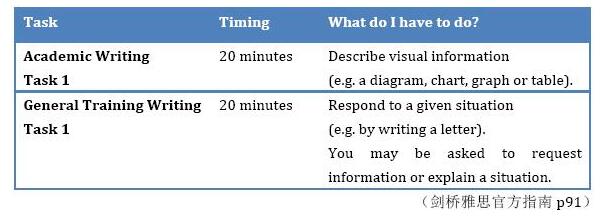来源:环球教育整理
小编:Jennifer 176雅思考试分为Academic(以下简称为A类)和General Training(以下简称为G类)两种模式。通常来说,以出国工作或者移民为目的的考生应该选择G类考试。A类和G类考试的区别在阅读和写作两项考试上,其中写作考试中的任务一G类与A类题型截然不同,请参见官方指南上的题型解释:

从官方介绍不难看出,G类写作任务一(以下简称T1)要求考生在20分钟左右完成一篇书信的写作,考生也许会被要求去询问信息或解释某些状况。但是,具体而言,考生可能会碰到哪些形式的书信写作呢?根据剑桥2-9八本真题以及近三年考试回顾,雅思G类T1书信类型主要包括感谢信、道歉信、投诉信、求职求学信、邀请信、建议信和咨询求助信等七种。本文将就常考的几种题型,给出相应的解题思路(即书信写作文章结构)与写作句型。
一、感谢信
1.书信结构
写感谢信时,书信主体部分一般分为三个段落。第一段自我介绍,表明自己的身份(如果给比较陌生的人写信),说明写信的目的并且表示清楚对对方的谢意。第二段详细说明对方帮助自己的过程,事情发生的具体细节,强调对方给予帮助的重要性。第三段提出回报对方好意的建议,并再次表达自己的感谢之情。
2.常用句型
1)I take this opportunity to express to you my deep appreciation for the kind assistance you rendered me.
2)I wish there were a better word than "thanks" to express my appreciation for your generous help.
3)My appreciation to you for your generous help is beyond words. I wish I could repay it one day.
4)Please accept my most cordial thanks for your timely help, which I will always remember.
5)Thank you from the bottom of my heart for your kind help.
6)I hope to have an opportunity to reciprocate your generosity.
7)I appreciate the support you have provided and your assistance has been invaluable to me.
二、道歉信
1.书信结构
道歉信通常有四个主要部分。第一部分自我介绍,说明写信目的,为自己做错的事表示歉意。第二部分说明当时情况并解释原因,提出有力的观点,侧重事实,避免归咎其他人。第三部分提出补救方案,表达自己想改过或者补救的希望,注意考虑收信人的情绪。最后一部分再次道歉,首尾呼应,表达不会再犯同样错误的愿望,建立信用和信任。
2.常用句型
1)I just wanted to write you a quick note to apologise for not being able to keep our appointment tomorrow.
2)In deference to your valuable time,I would like to get straight to the point and admit that I was wrong.
3)I really hope that you will be able to accept my apology.
4)Please accept my apologies for…
5)Please accept my sincere apology for missing the interview scheduled for…
6)Please accept my apology for the delay and thank you for your understanding.
三、投诉信
1.书信结构
投诉信是雅思考试中最常见的一种,写信时应该重点包括三个部分。第一部分为自我介绍、投诉事由、自己的感受等;第二部分为投诉的事实与理由,具体描述当时的情形,如人物、时间、地点和原因等。指出具体问题及其所产生的后果;第三部分可分为提出个人要求或者建议,清晰说明读信人可以做的补救措施,希望有关部门和人士做出相应的改进,以及提出愿望,希望早日得到答复。
2.常用句型
1)I am writing to express my dissatisfaction with .
2)There are some problems with that I wish to bring to your attention.
3)I regret to inform you that .
4)You can imagine my disappointment when I discovered that _.
5)You can imagine my feelings when I realized that this would mean .
6)Even though I telephoned you about , .
7)I hope that the authorities concerned will consider my suggestions and improve the situation as best as they can.
8)We trust that you will now consider this matter seriously and make an effort to prevent the recurrence of this kind.
9)We will appreciate your willingness to make up for the loss.